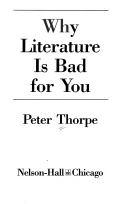Opinion is Not Necessarily a Good Thing
We live in a civilization that believes that opinion per se is good. This can be seen in the very derivation of the word, which comes from the Latin opinari, meaning to think. It is a fundamental tenet of our civilization that thinking is good, a noble process which is one of the few things separating us from the base animal world. I too believe that thinking is a noble calling and that it is necessary to have opinions for the sake of the kind of thinking that can lead us to a better world.
In the world of the arts there is so much pressure on us to take a stand of some kind that all too often we are caught in a frantic, mindless search for something to say, anything. We become Darlings. Much of what appears in the learned journals and scholarly books is there because we have given in to the pressure to have a view of art or of a particular work of art. And the publishing is rewarded. The structure of the academic world is devised to stop those who have no opinion from getting ahead. I sometimes feel that it is these unopinionated persons who are the real heroes, though they are not only unsung but trampled on. Perhaps they should be rewarded for having the strength of character to avoid giving in to the seductions of art.
Notes:
Folksonomies: opinion stance position
Taxonomies:
/society/sex (0.501528)
/art and entertainment/books and literature (0.491016)
/society (0.377426)
Keywords:
base animal world (0.918896 (negative:-0.260768)), fundamental tenet (0.726462 (positive:0.599753)), noble calling (0.712374 (positive:0.670277)), Latin opinari (0.712128 (negative:-0.289390)), noble process (0.707649 (negative:-0.260768)), Good Thing (0.695036 (neutral:0.000000)), mindless search (0.692645 (negative:-0.487010)), real heroes (0.646824 (positive:0.328735)), unopinionated persons (0.639707 (positive:0.328735)), scholarly books (0.639690 (positive:0.267852)), particular work (0.632369 (positive:0.267852)), better world (0.625096 (positive:0.670277)), academic world (0.594043 (negative:-0.617196)), thinking (0.539763 (positive:0.646769)), civilization (0.448101 (positive:0.599753)), kind (0.418852 (positive:0.670277)), pressure (0.366343 (positive:0.267852)), Darlings (0.335974 (positive:0.541081)), derivation (0.330747 (neutral:0.000000)), sake (0.311979 (positive:0.670277)), word (0.294715 (neutral:0.000000)), stand (0.291775 (neutral:0.000000)), strength (0.287525 (neutral:0.000000)), things (0.286970 (negative:-0.260768)), opinions (0.285291 (positive:0.670277)), publishing (0.284699 (positive:0.673800)), arts (0.283697 (neutral:0.000000)), journals (0.280554 (positive:0.267852)), view (0.279976 (positive:0.267852))
Concepts:
Arts (0.945883): dbpedia
The arts (0.918941): dbpedia | freebase | opencyc | yago
Art (0.817568): dbpedia | freebase
Music (0.795635): dbpedia | freebase | opencyc
2002 albums (0.739497): dbpedia
Belief (0.736510): dbpedia | freebase
English-language films (0.655972): dbpedia
Critical thinking (0.621193): dbpedia | freebase | opencyc | yago





